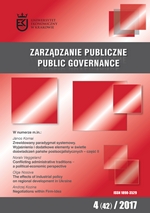The system paradigm revisited: Clarification and additions in the light of experiences in the post-socialist region – Part II
DOI:
https://doi.org/10.15678/ZP.2017.42.4.01Keywords:
autocracy, democracy, capitalist system, socialist system, post-socialist transition, HungaryAbstract
The term paradigm was introduced to the philosophy of science by Thomas Kuhn – he used this term to denote the specific approach applied by a school of research to examine its subject matter. Using the same paradigm, researchers seek answers to similar questions, and employ similar methods and concepts. In an article published in 2000, the author of this essay introduced the term system paradigm, which focuses on the systems functioning in a society. This study develops the theoretical considerations outlined in that earlier article on the basis of experience of post-socialist transition.
The first part compares the socialist and capitalist systems, describing their main characteristics, and concludes that the capitalist system has become established in former socialist countries, except for North Korea and Cuba. The second part analyzes varieties of capitalism within a typology which classifies prevailing forms of politics and government. Three markedly different types are identified: democracy, autocracy, and dictatorship. Huntington wrote about the “third wave” of democratization. This study concludes the third wave has dried up: for the 47 postsocialist countries, only a tenth of the population live in democracies, while autocracy or dictatorship prevails in all other countries in this group. The third part of this essay applies the conceptual and analytical apparatus to Hungary, where capitalism exists, and autocracy is the prevailing politico-governmental form – here we can find important characteristics common to other capitalist countries or other autocracies. This finding is compatible with the observation that there are some less fundamental characteristics unique to Hungary, or “Hungarica”, which differ from the characteristics of all other countries.
Downloads
References
Arendt, H. (1951/2004). The Origins of Totalitarianism. New York: Schocken Books.
Balog, K. (2016). An inconsistent triad: Trump, Sanders, Clinton, and the radical mismatch in the theater of politics. Quarks Daily, 13 czerwca, http://www.3quarksdaily.com/3quarksdaily/2016/06/aninconsistent-triad-sanders-clinton-trump-and-theradical-mismatch-in-the-theater-of-politics-by-k.html.
Baumol, W.J., Litan, R.E., Schramm, C.J. (2007). Good Capitalism, Bad Capitalism, and the Economics of Growth and Prosperity. New Haven–London: Yale University Press.
Benedict, J., Kerkvliet, T. (2015). Democracy and Vietnam. W: W. Coase (red.), Handbook of Southeast Asian Democratization (s. 426–441). Abington-on-Thames: Routledge.
Bertelsmann Stiftung (2016a). Transformation Index Methodology, www.bti-project.org/en/index/methodology.
Bertelsmann Stiftung (2016b). Codebook for Country Assessments, www.bti-project.org/fileadmin/files/BTI/Downloads/Zusaetzliche_Downloads/Codebook_BTI_2016.pdf.
Bertelsmann Stiftung (2016c). Bertelsmann Transformation Index Country Reports, www. btiproject.org/fileadmin/files/BTI/Downloads/Zusaetzliche_Downloads/BTI_2016_Scores.xlsx.
Bohle, D., Greskovits, B. (2012). Capitalist Diversity on Europe’s Periphery. Ithaca–London: Cornell University Press.
Chen, J., Dickson, B.J. (2008). Allies of the state: Democratic support and regime support among China’s private entrepreneurs. China Quarterly, 196, 780–804.
Csanádi, M. (2016). China in between Varieties of Capitalism and Communism. Budapest: Institute of Economics, Centre for Economics and Regional Studies, Hungarian Academy of Sciences.
Dahl, R.A. (1983). Dilemmas of Pluralist Democracy. Autonomy versus Control. New Haven: Yale University Press.
EBRD (2015a). Transition Indicators Methodology, www.ebrd.com/cs/Satellite?c=Content&cid=1395237866249&d=&pagename=EBRD%2FContent%2FContentLayout.
EBRD (2015b). Country-level Transition Indicators, www.ebrd.com/what-we-do/economicresearchand-data/data/forecasts-macro-data-transition-indicators.html.
EBRD (2015c). Tic: Transition Indicators by Countries, www.ebrd.com/cs/Satellite?c=Content&cid=1395245467784&d=&pagename=EBRD%2FContent%2FDownloadDocument.
Freedom House (2016a). Methodology, https://freedomhouse.org/report/nations-transit-2015/methodology.
Freedom House (2016b). Nations in Transit – Country Reports, https://freedomhouse.org/report/ nationstransit-2016/nit-2016-table-country-scores.
Gedeon, P. (2014). Piac és demokrácia: Barátok vagy ellenségek? (Market and Democracy: Friends or Enemies?). Politikatudományi Szemle, 23(1), 53–76.
Hall, P.A., Soskice, D. (red.) (2001). Variations of Capitalism and Institutional Complementarities of Comparative Advantage. Oxford: Oxford University Press.
Huang, Y. (2008). Capitalism with Chinese Characteristics. Entrepreneurship and the State. New York: Cambridge University Press.
Huntington, S.P. (1991). The Third Wave: Democratization in the Late Twentieth Century. Norman–London: University of Oklahoma Press.
King, G., Pan, J., Roberts, M.E. (2013). How censorship in China allows government criticism but silences collective expression. American Political Science Review, 107(2), 1–18.
Kornai, J. (2006). The great transformation of Central and Eastern Europe: Success and disappointment. Economics of Transition, 14(2), 207–244.
Kornai, J. (2014a). Példaképünk: Kína? (Can China set us an example?). W: T. Kolosi, I.G. Tóth (red.), Társadalmi Riport 2014 (s. 603–616). Budapest: TÁRKI Social Research Institute.
Kornai, J. (2014b). Threatening dangers, www.kornai-janos.hu/Kornai2014Threatening dangers.pdf. Oryginał po węgiersku: Fenyegető veszélyek. Élet és Irodalom, 58(21), 5.
Körösényi, A. (2003). Political representation in leader democracy. Government and Opposition, 40(3), 358–378.
Körösényi, A., Patkós, V. (2015). Liberális és illiberális populizmus (Liberal and illiberal populism). Politikatudományi Szemle, 24(2), 29–54.
Krastev, I., Holmes, S. (2012). An autopsy of managed democracy. Journal of Democracy, 23(3), 33–45.
Lakatos, I. (1978). The Methodology of Scientific Research Programmes (Philosophical Papers, volume 1). Cambridge: Cambridge University Press.
Langworth, R. (red.) (2013). Churchill by Himself: The Definitive Collection of Quotations. London–New York: PublicAffairs.
Lardy, N.R. (2014). Markets over Mao: The Rise of Private Business in China. Washington, D.C.: Peterson Institute for International Economics.
Lindblom, Ch.E. (1977). Politics and Markets. The World’s Political Economic Systems. New York: Basic Books.
London, J. (red.) (2014). Politics in Contemporary Vietnam: Party, State, and Authority Relations. Houndmills, England: Palgrave-Macmillan.
McGregor, J. (2012). No Ancient Wisdom, No Followers: The Challenges of Chinese Authoritarian Capitalism. Westport: Prospecta Press.
Naughton, B., Tsai, K. (red.) (2015). State Ca pitalism, Institutional Adaptation and the Chinese Miracle. New York: Cambridge University Press.
Pei, M. (2006). China’s Trapped Transition: The Limits of Developmental Autocracy. Cambridge, MA: Harvard University Press.
Redding, G., Witt, M.A. (2014). China: Authoritarian capitalism. W: G. Redding, M.A. Witt (red.), The Oxford Handbook of Asian Business Systems (s. 11–34). Oxford: Oxford University Press.
Schambaugh, D.L. (2008). China’s Communist Party: Atrophy and Adaptation. Washington: University of California Press.
Schell, O. (2016). Crackdown in China: Worse and worse. New York Review of Books, 21 (kwiecień), 12–16.
Schmitt, C. (1927–1932/1996). The Concept of the Political. Chicago: University of Chicago Press.
Schumpeter, J.A. (1942/2010). Capitalism, Socialism and Democracy. London–New York: Routledge.
Sz. Bíró, Z. (2012). Oroszország: válságos évek (Russia: Critical Years). Budapest: Russica Pannonicana.
Székely-Doby, A. (2014). A kínai reformfolyamat politikai gazdaságtani logikája (Political economic logic of the Chinese reform process). Közgazdasági Szemle, 61(12), 1397–1418.
Szelényi, I., Csillag, T. (2015). Drifting from liberal democracy: Neo-conservative ideology of managed illiberal democratic capitalism in post-communist Europe. Intersections. East European Journal of Society and Politics, 1(1), 18–48.
Taub, A. (2016). The rise of American authoritarianism. Vox, 1 marca, www.vox.com/ 2016/3/1/11127424/trump-authoritarianism.
Tsai, K. (2007). Capitalism without Democracy: The Private Sector in Contemporary China. Ithaca: Cornell University Press.
Weber, M. (1922/2007). Economy and Society. Berkeley: University of California Press.
World Economic Forum (2016a). Appendix: Methodology and Computation of the Global Compe titiveness Index 2015–2016, http://reports.weforum.org/globalcompetitiveness-report-2015-2016/appendix-methodology-and-computation-of-the-global-competitivenessindex-2015-2016/.
World Economic Forum (2016b). Global Competitiveness Report, http://reports.weforum.org/global-competitiveness-report-2015-2016/.
World Economic Forum (2016c). The Global Competitiveness Index Historical Dataset, 2005–2015, www3.weforum.org/docs/gcr/2015-2016/GCI_Dataset_2006-2015.xlsx.
Xu, C. (2011). The fundamental institutions of China’s reforms and development. Journal of Eco nomic Literature, 49(4), 1076–1151.
Zakaria, F. (1997). The rise of illiberal democracy. Foreign Affairs, listopad–grudzień, 22–43.
Zakaria, F. (2014). The rise of Putinism. Washington Post, 31 lipca, www.washingtonpost.com/opinions/fareed-zakaria-the-rise-of-putinism/2014/07/31/2c9711d6-18e7-11e4-9e3b-7-f2f110c6265_story.html.



